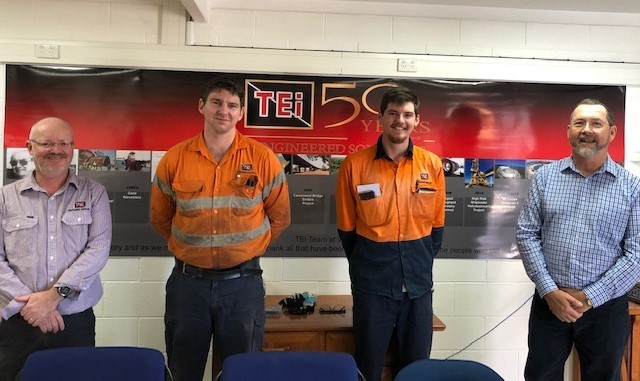
Labour shortages and the difficulties of attracting skilled workers have been front of mind for many companies in recent times. According to Ai Group’s latest CEO survey, released in January 2022, skills shortages ranked as the third most commonly nominated inhibitor of business growth in 2022 with almost three quarters (73%) of business leaders anticipating difficulties in finding and retaining skilled staff over the course of 2022.
Many companies talk about how hard it is to attract good staff, but some become proactive and go out of their way to develop their own. TEi Services is a good example.
TEi Services is a manufacturing, engineering and construction company based in North Queensland that has operated for over 50 years. From humble beginnings as a small jobbing shop, it now delivers a diverse range of engineered solutions including large industrial structural projects, complex mechanical projects and transport assets, government and mining capital infrastructure and mineral processing equipment. The mining equipment is sold to a world market, predominately African miners.
Richard Parker, General Manager at TEi Services, is always on the lookout for good people. When Georgia requested a work placement with TEi to support her engineering degree Richard jumped at the opportunity.
Georgia is a second year Mechanical Engineering student at James Cook University in Townsville. Women make up less than ten percent of engineering students at the university, which is a statistic reflected nationally.
Engineering students are required to complete 12 weeks of work placements in order to graduate. Most tend to favour one big placement at the end of second year, but Georgia is keen to gather a range of different experiences to help her decide her future pathway. When Georgia approached TEi, she was at the end of her first year. She completed five weeks at TEi Services and has placements at other companies lined up. Georgia’s experience at TEi Services prompted her to invite Richard to future industry nights at the university so he can offer placements for other students.
Georgia’s placement at TEi Services was much more varied than some of the larger firms provide. TEi Services has only three engineers on staff, so Georgia was exposed to the full range of what they can offer, including programming, modelling, 3D printing and administration. One highlight was learning to weld; a skill not usually taught to engineering students. “It’s not part of my degree, but I will be designing things that need to be welded,” said Georgia. “This gives me a better understanding of what to consider when I develop my designs”.
Georgia is one example of Richard’s attempts to attract women to his workplace. “Women have a positive influence on workplaces,” said Richard “because they can bring soft skills that men don’t often have. Women also make up 50 per cent of the potential future workforce so they can’t be ignored.” Richard has had to make some changes to the culture of the workplace to make it more comfortable for women and is now trying to build up their numbers. For example there is currently a female school-based apprentice in the machine shop. “The more women you can employ, the easier it gets,” said Richard. “When they see other women already working here they can see themselves doing the same thing.”
From making changes to the workplace, which might include moving on some dinosaurs, to actively seeking out engagement with secondary and tertiary education providers, these are simple actions any company can take to make them more attractive to a future workforce.